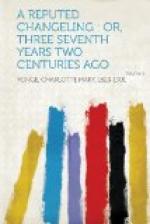There were far more formalities and delays before the travellers could cross the Tournay bridge across the Scheldt. They were brought to a standstill a furlong off, and had to wait while the trumpeter rode forward with the white flag, and the message was referred to the officer on guard, while a sentry seemed to be watching over them. Then the officer came to the gateway of the bridge, and Captain Delaune rode forward to him, but there was still a long weary waiting in the sun before he came back, after having shown their credentials to the governor, and then he was accompanied by a Flemish officer, who, with much courtesy, took them under his charge, and conducted them through all the defences, over the bridge, and to the gate where their baggage had to be closely examined. Naomi had her Bible in her bosom, or it would not have escaped; Anne heartily wished she had used the same precaution on her flight from England, but she had not, like her friend, been warned beforehand.
When within the city there was more freedom, and the Fleming conducted the party to an inn, where, unlike English inns, they could not have a parlour to themselves, but had to take their meals in common with other guests at a sort of table d’hote, and the ladies had no refuge but their bedroom, where the number of beds did not promise privacy. An orderly soon arrived with an invitation to Don Carlos Arcafila to sup with the Spanish governor, and of course the invitation could not be neglected. The ladies walked about a little in the town with Mr. Fellowes, looking without appreciation at the splendid five-towered cathedral, but recollecting with due English pride that the place had been conquered by Henry VIII. Thence they were to make for Ostend, where they were certain of finding a vessel bound for England.
It was a much smaller party that set forth from Tournay than from Paris, and soon they fell into pairs, Mr. Fellowes and Naomi riding together, sufficiently out of earshot of the others for Charles to begin—
“I have not been able to speak to you, Anne, since that strange interruption—if indeed it were not a dream.”
“Oh, sir, it was no dream! How could it be?”
“How could it, indeed, when we both saw it, and both of us awake and afoot, and yet I cannot believe my senses.”
“Oh, I can believe it only too truly! I have seen him twice before. I thought you said you had.”
“Merely in dreams, and that is bad enough.”
“Are you sure? for I was up and awake.”
“Are you sure? I might ask again. I was asleep in bed, and glad enough to shake myself awake. Where were you?”
“Once on Hallowmas Eve, looking from the window at Whitehall; once when waiting with the Queen under the wall of Lambeth Church, on the night of our flight.”
“Did others see him then?”
“I was alone the first time. The next time when he flitted across the light, no one else saw him; but they cried out at my start. Why should he appear except to us?”




